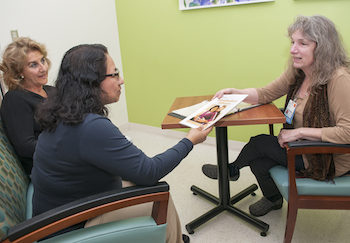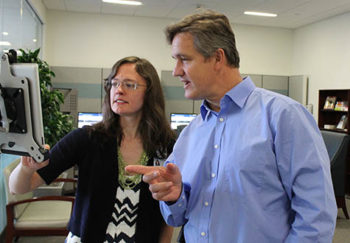
For many of us, hospitals and doctors’ offices can feel a bit confusing. The surroundings are unfamiliar. The language — peppered with complex medical terms — can be difficult to understand.
But for the more than 16% of Virginians who speak a language other than English, the healthcare environment is more than just intimidating. It can be inaccessible. Limited English proficiency (LEP), or not speaking English as your primary language, can be a significant barrier to care.
Fortunately, the U.S. Government requires any agency that gets federal funding to provide assistance to non-English speakers. These agencies include hospitals, clinics, health departments, social services offices and public schools. Hospitals and other care providers must offer LEP patients the resources they need to easily access healthcare and health information.
“There was an executive order signed in 2000 that improved access to services for people with limited English proficiency,” says certified medical interpreter Sylvana Fernandez-Ellauri. “One of the improvements that resulted from that was better provisions for the use of trained interpreters in the healthcare setting.”
Better Access to Medical Interpreters in Charlottesville
It’s now standard practice here at UVA, when patients make an initial appointment, to ask them about their preferred language. If a patient is a non-English speaker, the scheduler will “flag” their medical record. The system then automatically alerts providers that the patient requires language assistance on the day of their appointment, explains Fernandez-Ellauri.
The need for these services in Charlottesville is great. Charlottesville is an International Rescue Committee (IRC) office site, so many refugees come to UVA for their care. The IRC is a national organization. It provides services to refugees, immigrants and asylum-seekers who must escape their home country and seek to rebuild their lives in the U.S.
“Spanish speakers are the biggest population we serve,” says Fernandez-Ellauri. “But there is also a big demand for Arabic, Dari, Nepali, American Sign Language (ASL) and Chinese.”
Fernandez-Ellauri, who speaks Spanish, is part of a team of 11 staff interpreters. In addition to in-person interpretation services, we provide language services through phone and remote video devices.
“Our office decides what kind of assistance they require at each appointment based on our available resources, the nature of each appointment or the needs of the patient,” says Fernandez-Ellauri. “For example, if they are hard of hearing and can’t use the phone or if they’re having a first-time visit with an oncologist, then we try to provide an in-person interpreter. If they speak an uncommon language, for which it’s difficult to find an in-person interpreter, then phone interpretation may be necessary.”
What A Non-English Speaker Can Expect
If you have a friend or relative seeking medical care who doesn’t speak English, it may be helpful to set expectations prior to their appointment. Having an interpreter improves communication between a patient and care provider. But a visit to the hospital or doctor’s office still presents some challenges for non-English speaking patients.
Longer Appointments
It takes more time to relay information via a third party. Also, doctors and other care providers may speak more slowly and repeat information to ensure the patient understands.
Less Privacy
Sensitive health information patients typically share only with their doctors must go through an interpreter, so some may feel hesitant to open up.
“We remind patients that we will not share any information disclosed during the encounter. Everything is confidential,” says Fernandez-Ellauri.
Possible Lack of Connection
The personal connection between a provider and patient may be slower to develop when there isn’t a direct line of communication.
“I think the camaraderie may be lost or harder to achieve. Sometimes there’s no translation for those little things that doctors say that allow them to connect with a patient, those nuances of daily life or jokes. These can be difficult to interpret or have no cultural equivalent,” says Fernandez-Ellauri.
Navigating Complex Terms, Medical Ethics and Cultural Differences
Certified medical interpreters don’t just know the language. They’ve been specially trained to navigate ethical challenges and to communicate sensitive and complex medical information. They also have awareness about the cultural differences that make each patient unique.
“Each patient is a universe,” says Fernandez-Ellauri. “It’s impossible for us to know about all of the nuances of different cultures. But as interpreters, we are more aware and more sensitive. We may be able to help a doctor or nurse explore those differences, but not use our perceptions to put culture into the mouths of the patient.
“For example, just because I am from Uruguay doesn’t mean that I drink mate and like soccer. Generalizations are not always accurate. So we are sensitive to that.”
Getting the Most Out of a Doctor Visit: 4 Tips for Helping a Non-English Speaker
Challenges will arise when bridging the language gap. But remember: Laws and processes exist to help give all patients access to the care they need and deserve.
To ensure LEP patients make the most of the resources available to them, Fernandez-Ellauri recommends these steps.
1. Request Language Assistance
The patient has a legal right to request interpreter services or translation of health documents at any point during care. Asking for this assistance will not impact the level of care they receive.
2. Make Sure to Use a Professional Medical Interpreter
Some providers may be bilingual or understand the patient’s language well enough to speak to them directly. But only a trained medical interpreter has the necessary skills to interpret complex medical information appropriately.
Avoid temptation to interpret yourself. Despite your best intentions, you might be tempted to withhold personal facts or protect the patient from hearing a diagnosis.
Need an Interpreter?
Interpreters are free for non-English speaking patients and families. Contact UVA Interpreter Services.
Also, it’s important to note that children are not legally allowed to act as interpreters. They may not know the English language well enough to interpret complex medical terms. Also, they may not have enough maturity to handle sensitive information.
3. Encourage Questions
Patients have the right to ask questions and make the best decisions for themselves. Encourage them to find out why the care team recommends a treatment and how and when it will be performed.
4. Be an Advocate
Non-English speaking patients have the same rights as any other patient. If you feel your friend or loved one has not received adequate care, encourage them them to contact the Patient Relations team.


Thanks for mentioning how relaying medical information through a third party takes a lot of time. For this reason, it is important to have the patient or the doctor speak the needed language. My mom needs to find a doctor that speaks Spanish, so I wanted to learn more about this topic.